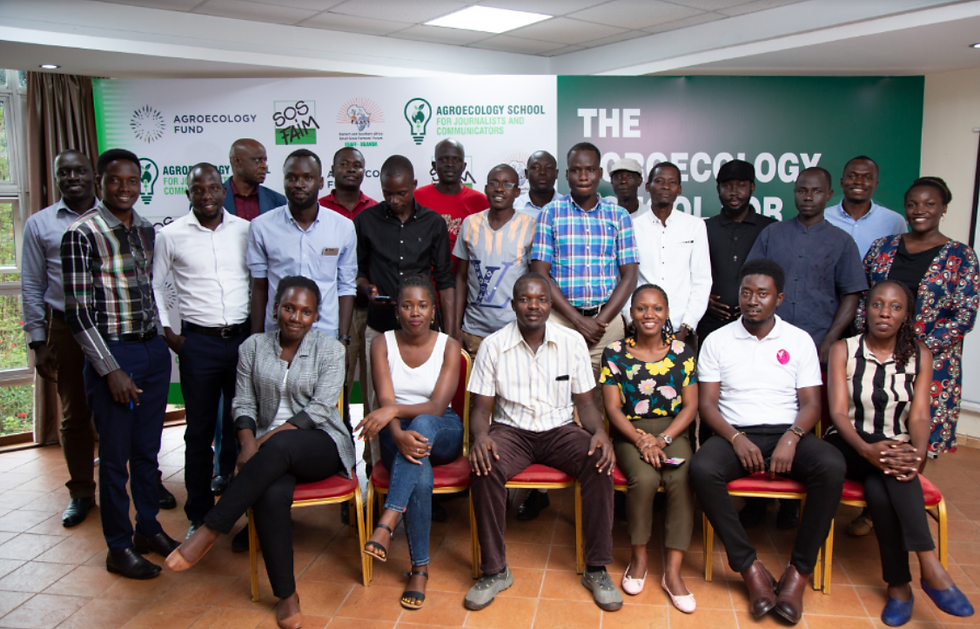ESAFF Uganda organizes the First class of the Agroecology School for Journalists and Communicators
- Rashida Kabanda
- Sep 2, 2022
- 4 min read

Agriculture has multiple connections to critical aspects, such as food security, livelihoods, especially for the rural poor, ecosystems, climate change, and health, making it a crucial sector for achieving the Sustainable Development Goals (SDGs). By 2050, the earth will need to feed close to 10 billion people. We must transform our agricultural and food systems, so they work with and not against nature. Agroecology, which can drastically reduce hunger and malnutrition, is the only approach that brings small-scale farmers closer to solving the current food sovereignty challenges in Uganda mainly because it allows efficient resource use, reduces harmful external inputs, and improves soil health. The transition to Agroecology is faced with many challenges; still, one of the most impactful is communication – knowing the power that media has in transforming society’s policies and practices, our campaigns haven’t prepared journalists and communicators for this significant role hence missing the mark.
The media, particularly Journalists and Communicators, haven't been very active in influencing public opinion on agroecology despite the dedication of small-scale farmers to scaling up agroecology in Uganda through practice change and policy influencing. Small-scale farmers in Uganda believe that if the media started supporting agroecology, people would start eating healthier food and would become aware of the harmful effects of industrial or conventional agriculture on the environment and people's health. As more people switch to eating the healthy foods that small-scale farmers produce, this would also benefit both the health of the general public and the incomes of small-scale farmers.
On the 25th of November 2021, ESAFF Uganda official launched the Agroecology School for Journalists and Communicators with an aim of building a network of journalists and communicators around Uganda and Africa working with small-scale farmers to contribute to the national and continental transition to Agroecology through disseminating the right information.
The foundation of this school entailed a number of tasks, such as the creation of course materials, the creation of an online learning environment, and the development of a powerful agroecology-focused movement of journalists and communicators, among other things.
The Agroecology School for Journalists and Communicators held its first class on August 29, 2022, in the Wakiso district thanks to ESAFF Uganda. This served as an official introduction of the online Agroecology course for journalists and communicators, as well as the course facilitators, with the goal of further educating the public about the course. Agroecology Fund and SOS FAIM representatives, along with 18 journalists and 10 developers of course content attended the inaugural class.
The National Chairperson of ESAFF Uganda, Mr. Hakim Baliraine, welcomed the participants and expressed gratitude for their significant interest in learning about agroecology. He said that the advancement of agroecology depends heavily on journalists and communicators. He believes that once their capacity and knowledge in agroecology are increased, they will play a critical role in sharpening the conversation about sustainable food systems towards increasing comprehensive awareness and appreciation of agroecology among policymakers, consumers, and small-scale farmers as the key pillar in creating a sustainable food system and ensuring food sovereignty.
Mr. Andrew Adem told the journalists that the course will take a period of 3 months after which there will be an award ceremony involving awarding of certificates to successful Journalists and Communicators. He noted that Journalists and Communicators should be keen as they will work with small-scale farmers in order to upscale agroecology through the work that they will be doing in the farming communities.
“As part of this course journalists will take a field trip to small-scale farmers’ farms to have a better experience of agroecological practices and have a chance to interact with members of the different agroecological demonstration sites, Community Agroecology Schools and Agroecology Clubs in learning institutions.” He added.
Journalists and communicators shared their experiences in media as well as the anticipated challenges while undertaking the course.
“As a journalist, this is an eye opening experience. Despite writing various articles on agriculture, I had never taken interest in researching about agroecology probably because I wasn’t aware about it. It is now our mandate as journalists to go back to our respective districts and spread information about Agroecology and put into practice as well.”- Gaaba Lakel Maria, SEE TV
The Agroecology School for Journalists and Communicators will empower Journalists and Communicators to acquire knowledge on agroecology that will enable them to write stories that promote agroecology. Media is important in the promotion of agroecology especially through sharing knowledge and information.
However, Journalists and Communicators shared some of the bad experiences that are associated with their work including suppression of the media, misunderstanding of the information shared, limited disclosure of information by the sources, and media censorship among others that affects their work. These bad experiences can therefore be overcome by working closely with small-scale farmers and authorities.
“According to me, I find that sometimes challenging to report bad things about the politicians because they have the audacity to summon you for questioning and threaten the lives of Journalists. In most cases the politicians want us to only report good things about them which makes our work hard” - Ronald, Aulogo FM in Adjumani




Comments